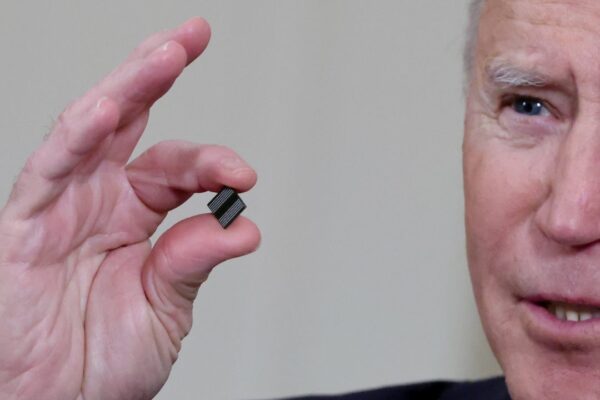
US CHIPS Act also supports Open RAN – details
The CHIPS Act of 2022 has passed through both the US Senate and House of Representatives this week, and now awaits signing by president Joe Biden.
The main aim of the $79bn Act, Creating Helpful Incentives to Produce Semiconductors (CHIPS), is to address the shortfall in chips currently manufactured in the US, which is currently just 12%, compared to 37% in the 1990s. The United States also lacks capabilities to produce the most advanced chips at volume.
The CHIPS Act of 2022 provide funding for both the CHIPS for America Act and the USA Telecom Act over the next five years, so is much more than just a $52bn subsidy for fab builders such as Intel. It will also be compared to the European CHIPS Act currently being developed by the European Commission. It also includes $25bn of tax credits over the next ten years.
For telecoms, up to $1.5bn will be available to accelerate development of open architecture OpenRAN systems that would allow for alternative vendors to enter the market for specific network components, rather than having to compete with Huawei end-to-end.
The manufacturing support is $39bn, including $2bn for mature process technologies which have actually been a problem area in the supply chain, This will benefit companies such as Microchip and Analog Devices with mature fabs in the US. The support also includes support for assembly, testing, advanced packaging and research and development
A separate Research and Development stream will provide $11bn and will include a National Semiconductor Technology Centre (NSTC). This will be a public-private partnership to conduct advanced semiconductor manufacturing R&D and prototyping, invest in new technologies and expand workforce training and development opportunities. IBM was pushing for the centre to be located in New York state.
A National Advanced Packaging Manufacturing Programme will also be funded as well as a Manufacturing USA Semiconductor Institute to research virtualization of semiconductor machinery, development of ATP capabilities, and the development and deployment of training.
The Act also funds a research program at the US National Institute of Standards and Technology (NIST) on metrology and measurement science, standards, material characterization, instrumentation, testing, and manufacturing capabilities.
Finally there will be $200m for an education fund to kick start development of the domestic semiconductor workforce, which faces near-term labour shortages, by leveraging activities of the National Science Foundation.
Within the Act there is also the $2bn for the CHIPS for America Defense Fund to implement the Microelectronics Commons, a national network for onshore, university-based prototyping, lab-to-fab transition of semiconductor technologies—including unique applications for the Department of Defense—and semiconductor workforce training. There is also $500 million for a CHIPS for America International Technology Security and Innovation Fund.
The passing of the Act was welcomed by Intel, which is relying on the support to build fabs ata new site in Ohio.
“I congratulate Congress on voting to approve funding for the CHIPS Act. This is a critical step to support the entire U.S. semiconductor industry and to help ensure continued American leadership in semiconductor manufacturing and R&D. Congress has done its part, and now we are going to do ours. I’m excited to put shovels in the ground as Intel moves full speed ahead to start building in Ohio,” said Pat Gelsinger, CEO of Intel.
It was of course also welcomed by the Semiconductor Industry Association.
“By passing the CHIPS Act, Congress has risen to a defining challenge of our time, seized an historic opportunity to fortify American semiconductor manufacturing, design, and research, and delivered a big win for our country. The bill’s investments in chip production and innovation will strengthen America’s economy and national security – both of which rely heavily on chips – and reinforce our country’s semiconductor supply chains,” it said.
Related articles
- US chip group makes recommendations for CHIPS Act funding
- Intel confirms $20bn fab and foundry in Ohio
- Restructuring, slowing markets hit Intel results
Other European Chips Act articles
- Europe preps its CHIPS Act
- EU wants chips with everything
- Germany lines up €14bn for chips
- European Chips Act could include powers for EU control
Other articles on eeNews Europe
- CEO interview: Americo Lemos of IQE on scaling up
- Analyst Penn casts blame on Nexperia as Newport takeover investigated
- Gartner slashes 2022 semiconductor market forecast, sees 2023 fall
- NXP continues its Covid-19 bounce back
- Intel signs MediaTek as foundry customer
- Eutelsat to buy OneWeb – updated
 If you enjoyed this article, you will like the following ones: don't miss them by subscribing to :
eeNews on Google News
If you enjoyed this article, you will like the following ones: don't miss them by subscribing to :
eeNews on Google News



